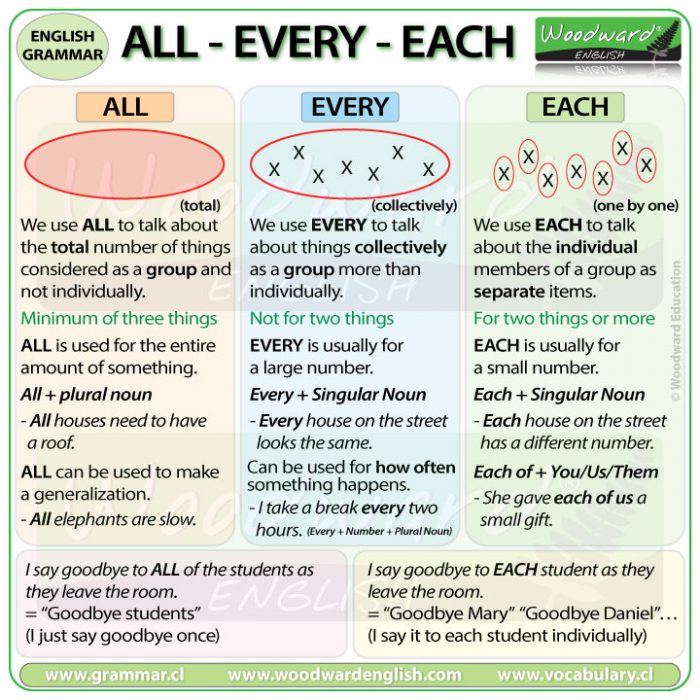What is the difference between all, every and each?
A simple explanation is:
We use ALL to talk about the total number of things, with everything considered as one group and not individually.
ALL is used for the entire amount of something. This amount is a minimum of three things. When there are two, instead of saying ALL you say BOTH (We will learn more about BOTH in another lesson)
We use EVERY to talk about things collectively as a group more than individually. There are a number of individual people or things together though they are collected together and considered as a group.
EVERY is usually for a large number. Never for two things or two people.
We use EACH to talk about the individual members of a group as separate items. These individuals may all be of a similar type of characteristic though they are considered one by one, not as a group.
EACH is usually for a small number. (It is easy to count each individual person or thing) It can be used for two or more things or people.
All + plural noun
ALL is used with a plural noun For example:
- ALL houses need to have a roof.
Yes, if it is a house, it needs a roof.
We look at the total group as one. All houses, no exceptions.
We are talking about all houses in general. If you want to specify a group of houses, you could also say:
- All of the houses need to have a roof.
But in this case, we only use ALL OF THE houses if we have already talked about these specific houses previously. They are a specific group of houses we mentioned before. We will see more about this in another lesson.
ALL can also be used to make a generalization. For example:
- All elephants are slow.
Yes, all of the elephants in the world are, in general, slow.
EVERY / EACH + singular noun
After EVERY and EACH we use a singular noun.
EVERY + Singular noun
EACH + Singular noun
Let’s look at an example of EVERY + Singular noun
- Every house on the street looks the same.
Here we consider the houses collectively as one group. Each house in that group looks the same. They have the same design, same number of windows, they are painted the same color. Every house on the street looks the same.
Let’s look at an example of EACH + Singular noun
- Each house on the street has a different number.
We use EACH because we consider each house individually, one by one. This house has a different number and this house has a different number and this house and this house etc. they have a different number.
Each is used when we consider them individually, one by one.
Every + number + plural noun
EVERY can be used for how often something happens. For example:
- I take a break every two hours.
We have every + number + plural noun
- Every two hours
- Every ten days.
- Every five minutes
This tells us the frequency something happens.
There are more uses of EVERY though we will see them in a separate lesson.
Each + of + object pronoun (you/us/them etc.)
EACH can be used with OF + an object pronoun such as you/us/them etc. For example:
- She gave each of us a small gift.
Yes, she gave a gift to each of us individually… not one gift for the group.
There are more uses of EACH though we will see them in a separate lesson.
What is the difference between EACH and EVERY?
Each considers all members individually while every refers to all members of a group collectively.
Every is also closer in meaning to All.
Look at this example.
- Each book in the course must be read before the end of the semester.
Here we think of all of the books individually, one by one forming the total.
But look at this sentence:
- Every book in the course must be read before the end of the semester.
Here we think of all of the books collectively as a group.
There is less emphasis on them individually compared to each.
Almost / Nearly + Every …
We cannot use Each with the words Almost or Nearly. Here we use Every. For example:
- Almost each car pollutes the environment. (This is NOT correct. You cannot use the word EACH with ALMOST)
The correct way to write this is:
- Almost every car pollutes the environment. (This is correct)
What is the difference between ALL and EACH?
All refers to the entire group as a whole. Each refers to the individual members of the group.
- I say goodbye to all of the students as they leave the room.
(= Goodbye students … I just say the word goodbye once)
- I say goodbye to each student as they leave the room.
(= Goodbye Ange, goodbye Diego, goodbye Daniel… etc. until it has been said to ALL of the students individually… Yes, there is a lot of repetition if you say goodbye to each student.)
Notice how in the first sentence, ALL is used with the plural noun students.
However, in the second sentence, EACH is used with the singular noun student.
What is the difference between ALL and EVERY?
A simple way to remember is that All is with a plural noun + plural verb while Every is with a singular noun + singular verb. Every can also suggest “without exception”.
- All students receive a certificate. (Students is a plural noun – receive is a plural verb)
- Every student receives a certificate. (Student is a singular noun – receives is a singular verb)
We use All with uncountable nouns (and not Every) because they cannot be counted individually.
- I like all music (NOT every music – you cannot count music)
- Place all luggage on the scales. (NOT every luggage – you cannot count luggage)
We will look at more meanings and uses of ALL, EVERY and EACH in separate lessons.
I hope you found this English grammar lesson useful. If you did, please let other people know about this free lesson.
All, Every, Each – Summary chart

